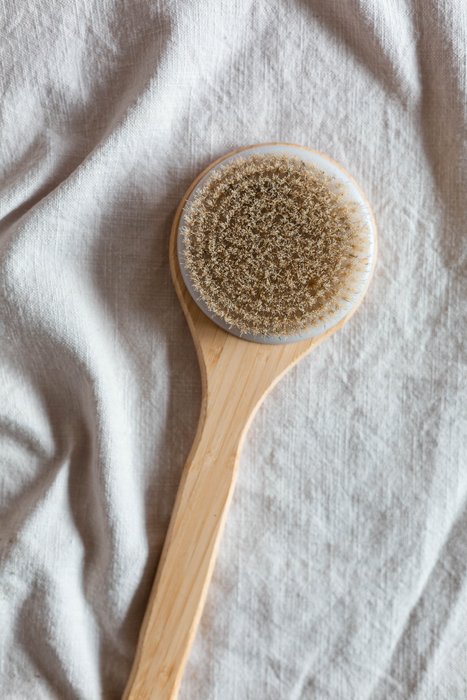Skincare: More than meets the eye
Today I've got skin health and immunity on the brain. More specifically, the connection between the two. In the field of functional nutrition, we believe that everything in the body is connected to each other – and that all of our daily choices matter on the path to optimal health and wellness. Lately, I’ve been talking about the importance of choosing safer personal care products – like face wash or lipstick – and how this one step can make a difference in your health.
Your skin is the largest organ in your body and is a critical component of your immune system. I want to share more education around this topic so you can make connections that inspire you into action.
Let’s start with a very brief overview of the immune system.
The immune system has three lines of defense:
1. the physical barriers (aka the skin on the outside and inside of your body — yes, there’s skin in there!)
2. the innate immune system
3. the adaptive immune system.
All of these layers work together like players on a team to fight off invading pathogens while simultaneously protecting your own cells and tissues from their attacks. For our purposes today, we’ll be focusing on that first line of defense: the skin.
You can think of your skin as a strong shield that covers your body. It’s a protective barrier that keeps harmful bacteria and viruses out of your system. Taking good care of your skin through a balanced diet, proper hydration, sun protection, gentle skincare routines, stress management, and a healthy lifestyle can help maintain its integrity and the health of your immune system.
Understanding Autoimmunity:
In my practice, a lot of the cases I encounter have suspicious signs and symptoms of autoimmunity – a condition characterized by an immune response against one's own cells and tissues. In a healthy individual, the immune system is able to distinguish self from non-self (foreign pathogens). The immune system is able to do its job in the background, keeping you safe from illness and infection. However, in people with autoimmune disease, the immune system does not have this tolerance to self, in which case the powerful “weapons” of the immune system are directed toward self (our own cells and tissues). This causes injury and inflammation in the body’s tissues. Autoimmunity can be systemic or organ-specific and can lead to various health issues. It’s essential to seek medical advice for proper evaluation and to determine the next best steps for support.
The Gut-Skin Connection
There’s a growing body of evidence that connects the health of your gut microbiome to your overall health – it impacts your body beyond your gastrointestinal health. This includes your immune status, as well as your skin health. An unhealthy microbiome has been linked to several inflammatory skin conditions.
This bi-directional relationship (meaning, it goes both ways) between your gut microbiome and skin health is referred to as the gut-skin axis. One of the ways this connection is regulated is through your immune system. (Are you connecting some dots here?)
When I stop to consider the importance of skin — the largest organ on the body — to the health of the immune system and the gut microbiome, I can't help but view the trendy phrase Get the Glow in a new light.
In case you're unfamiliar with this phrase, it refers to a "glowing, radiant complexion," and one Google search will reveal over 200 million tips and tricks on how to achieve it. While, sure, it’s nice to have a clear, calm complexion, what’s even more important is what these characteristics point to: a well-functioning, balanced body with low levels of inflammation.
Here's a bit of personal history for you: When I hit my preteen phase of life, I was plagued for years (years!) with skin issues. Specifically, relentless acne that was deep, painful, and — my face was regularly swollen and puffy. (These are the four major components of inflammation). My parents tried everything to help me find remedy: topical creams, Stridex, Clearasil, antibiotics, and anything else that promised a clear complexion.
What we didn’t consider as foundational to healing my skin woes was food and lifestyle choices. Looking back on that time with my current knowledge base, nothing was going to help my skin until I healed my internal terrain. As mentioned above, acne is a good example and indicator of inflammation within the body, as is rosacea, psoriasis, and eczema.
As we’ve established, skin health is integral to your natural immunity and gut health. So it stands to reason that practicing good habits in caring for your skin will comprehensively improve both systems — not just your appearance! Given the bi-directional relationship between the gut, the immune system, and skin, when you improve the health of any of these systems or organs, the others will benefit!
In today’s post, I’m sharing a few of my non-negotiables for skin care.
DRY BRUSHING // WASHCLOTH EXFOLIATION
Dry brushing is the act of running a soft natural-bristle brush over the skin. Said to improve circulation and stimulate the lymphatic system — the system that helps clear away waste and toxins in the body — this practice has been in the skin-care spotlight for a while. More than anything, this practice will help to get rid of dead skin cells, which can lead to a duller complexion. Skin cell turnover is a process that occurs naturally in our bodies, but slows down as we age. Dry brushing acts as a method of exfoliation that helps keep your skin more vibrant and, reportedly, your insides more clean. Dry brushing isn't a habit that I do every day. Once or twice a week will suffice as too much exfoliation can damage the skin's protective barrier (i.e. that first line of defense for the immune system).
On the days that I don't dry brush, I use a warm washcloth as a method of exfoliation. This is much more gentle and soothing and is great for those with sensitive skin. Simply wet a washcloth with warm water, and rub in circles over your skin. This not only feels amazing, but is also relaxing, and, of course, beneficial to your skin and immune system.
SAFER BODY PRODUCTS
Just like you wouldn’t knowingly eat or drink harmful chemicals, it’s in your best interest to not slather your skin with them either. Yet, most products on the mainstream market are filled with ingredients that create issues for your skin, and therefore your immune system. Not to mention, your endocrine system (hormones), too. I’ve tried and tested my fair share of natural, organic body products, and it’s no secret that my preferred brand is Beautycounter. I’ll be sharing more information and resources on the topic of safer beauty.
HIGH-QUALITY FOOD AND WATER
Eating nutrient-rich foods is one of the best ways to nourish your cells — not just your skin cells, but every cell in your body. While we typically think of protein, carbohydrates, and fats (i.e. macronutrients) when discussing nutrition and diet, the nutrients that are especially relevant to skin health are micronutrients. These include vitamins, minerals, and phytonutrients that are needed by the body in very small amounts.
According to the American Skin Association, these are the nutrients that are most effective in maintaining skin health:
• Vitamin A
• B Vitamins including B1, B3 and B6
• Vitamin C
• Vitamin D
• Water
Here are a few potent food sources for each of those nutrients:
• liver, carrots, apricots (dried), collard greens, kale, sweet potatoes
• whole grains, seeds and nuts, organ meats, eggs (if tolerated), potatoes, cauliflower
• acerola cherries, citrus fruits, peppers, broccoli, Brussels sprouts
• sardines, salmon, butter (grass fed and only if tolerated) egg yolks (if tolerated)
• clean, filtered water, herbal tea, fresh fruits and vegetables
I’ve also created a list of supplements for those who are dealing with compromised digestion and may need extra support with nutrient absorption. You can view my Skin Health Protocol here.
Lifestyle Factors
Lifestyle choices also play a significant role in supporting a healthy immune system and radiant skin.
Stress management is vital, as chronic stress can suppress immune function, dampen digestive capacity, and worsen skin conditions.
Regular physical activity can improve circulation and support detoxification processes, benefiting both your skin and overall health.
Prioritize sufficient sleep, as it is during rest that the body repairs and regenerates. Lastly, consider strategies to reduce exposure to environmental toxins, which can impact immune function and skin health.
By integrating these lifestyle factors into your daily routine, you'll be taking important steps to create a calm immune system and promote healthy, youthful skin.
So tell me: What's one thing you will do this week to lavish your skin and immune system with love? Comment below to share with me. I'd really love to hear from you!
References
Examine.com. (2022). Autoimmune Disease. Examine.com. https://examine.com/categories/autoimmune-disease/
Block, R. (2023). Gut Health and Its Impact on the Skin. Dermatology Times. https://www.dermatologytimes.com/view/gut-health-and-its-impact-on-the-skin
Thye, A. Y.-K., Bah, Y.-R., Law, J. W.-F., Tan, L. T.-H., He, Y.-W., Wong, S.-H., Thurairajasingam, S., Chan, K.-G., Lee, L.-H., & Letchumanan, V. (2022). Gut–skin axis: Unravelling the connection between the gut microbiome and psoriasis. Biomedicines, 10(5), 1037. https://doi.org/10.3390/biomedicines10051037
American Skin Association. (n.d.). Healthy Skin. https://www.americanskin.org/resource/






